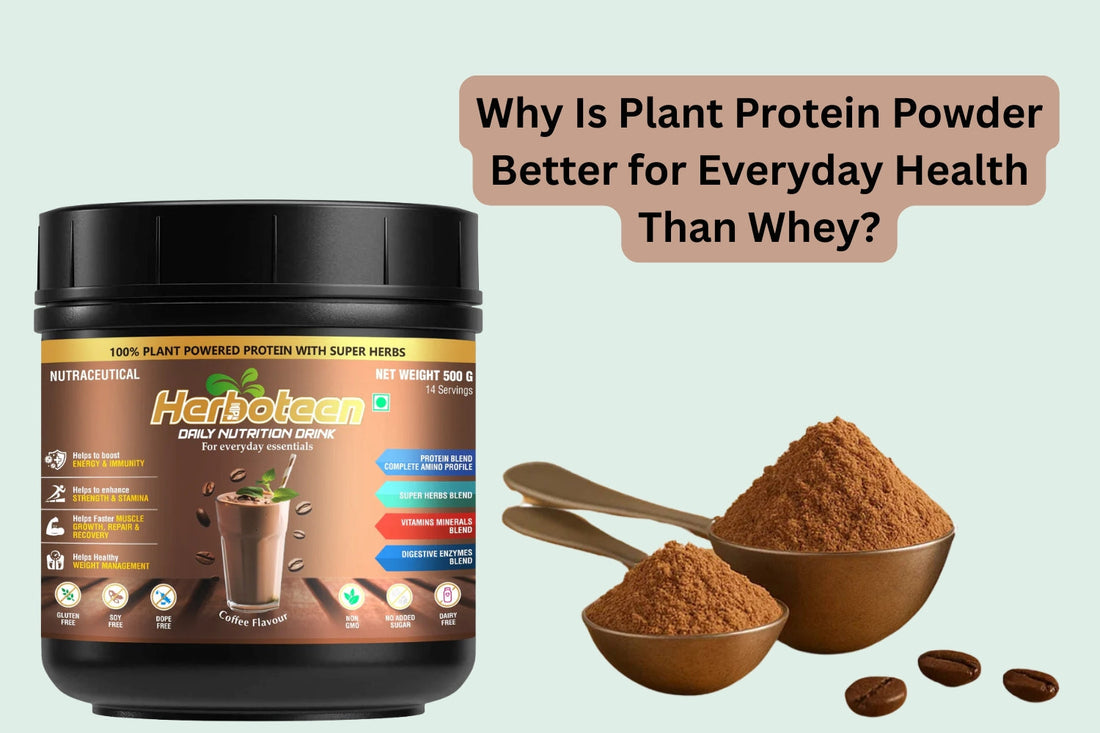
Why Is Plant Protein Powder Better for Everyday Health Than Whey?
Share
How does plant protein powder support overall health?
People often think protein powders are only for bodybuilders, but that’s not true. Plant protein powder works for anyone because it supports everyday health. It contains essential amino acids that the body cannot produce on its own. These amino acids help repair tissues, build immunity, and provide lasting energy.
Many plant protein powders also include fiber, which supports digestion, and natural antioxidants that fight stress in the body. Unlike whey, which is more focused on quick muscle recovery, plant protein powder brings balance by improving gut health, supporting metabolism, and boosting energy without heaviness.
Plant Protein = Everyday Health

Can plant protein powder help with weight management?
Yes, plant protein powder is often used by people who want to manage weight in a healthy way. Protein keeps you full for longer, which reduces unnecessary snacking. Since plant protein is rich in fiber as well, it helps control appetite naturally.
Whey protein may also keep you full, but for those who feel bloated or uncomfortable after dairy, sticking with it can be difficult. Plant protein powder allows you to maintain a high-protein diet comfortably, making weight goals easier to achieve.
Is plant protein powder good for fitness and recovery?
One of the biggest questions people ask is whether plant protein powder is strong enough to support workouts like whey does. The answer is yes. Pea protein, rice protein, and hemp protein all provide essential amino acids that repair muscles after exercise. While whey is known as a “fast-digesting” protein, plant protein works steadily, offering recovery without digestive stress.
For people who do regular gym sessions, yoga, or running, plant protein powder is a reliable option. Even casual fitness lovers benefit because it strengthens muscles, keeps energy levels balanced, and avoids the crash that sometimes comes with heavy protein shakes.
From Pea, Rice & Hemp - Essential Aminos That Support Muscle Growth & Everyday Health

How do plant protein powders compare with whey nutritionally?
The nutritional profiles of plant protein powder and whey protein differ slightly. Here’s a simple comparison:
|
Nutrient |
Plant Protein Powder |
Whey Protein |
|
Protein |
20–25g per scoop (varies by blend) |
20–25g per scoop |
|
Fiber |
Naturally high |
Very low |
|
Lactose |
None |
Contains lactose |
|
Vitamins & Minerals |
Rich in iron, magnesium, antioxidants |
Rich in calcium, B vitamins |
|
Suitability |
Vegan, vegetarian, lactose-intolerant |
Only for dairy consumers |
This shows that while both provide protein, plant protein powder comes with added nutrients like iron and fiber, which are missing in whey.
Is plant protein powder suitable for everyone?
Yes, and this is one of its biggest advantages. Plant protein powder works for people of all ages. Since it is dairy-free, gluten-free (in most cases), and vegan-friendly, it fits almost every diet. For people who are allergic to dairy, plant protein powder becomes the only practical choice.
The versatility makes it more than just a fitness supplement. Parents, working professionals, and even older adults can add it to their meals without worrying about side effects.
Why are people switching to plant protein powder today?
More people are now aware of how food impacts long-term health. With rising cases of lactose intolerance, digestive issues, and lifestyle-related health problems, plant protein powder offers a safer and more inclusive alternative. It’s not only about muscle growth anymore but about complete wellness energy, digestion, weight balance, and immunity.
Social media and health experts also highlight its benefits, which has increased trust among everyday consumers. This shift is why plant protein powder is slowly replacing whey in many households.
How can you use plant protein powder daily without hassle?
Plant protein powder is very easy to include in everyday life. It can be mixed into smoothies, shakes, oats, or even baking recipes like pancakes and protein bars. Unlike whey, which sometimes has a strong dairy taste, plant protein powders often come in mild flavors that blend well with fruits or nuts.
The goal is not just to use it as a workout drink but as part of regular meals. For example, a scoop in morning smoothies, mixed in overnight oats, or stirred into warm almond milk can all work.
Easy Everyday Ways to Enjoy Plant Protein

Final thoughts people search for on plant protein powder
When people compare plant protein powder with whey, the key differences are digestibility, inclusivity, and overall wellness. Whey may still work for some athletes, but for most people, plant protein powder is the better choice. It’s gentle on the stomach, rich in fiber and nutrients, and suitable for all diets.
For everyday health, where balance matters more than extremes, plant protein powder offers a practical and reliable solution.
For information, visit herboteen.com
